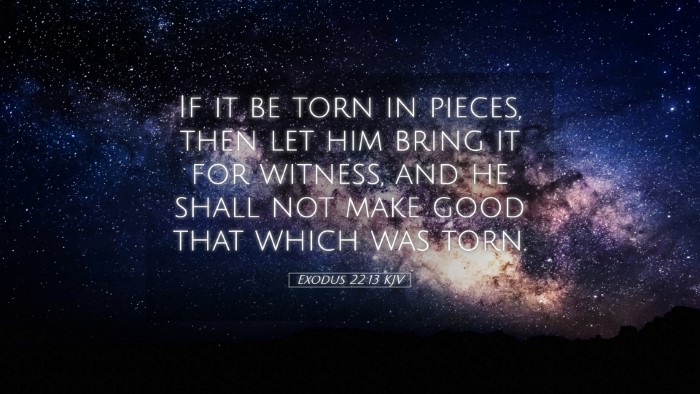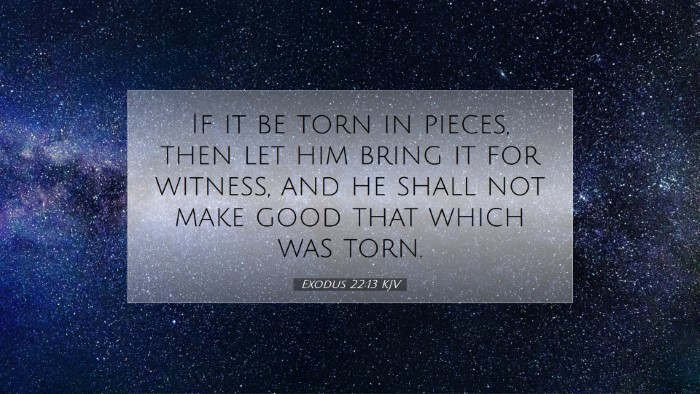Exodus 22:13 Commentary
Verse: "If it be torn in pieces, then let him bring it for witness; and he shall not make good that which was torn."
Introduction
This verse is part of a larger section in the Book of Exodus that outlines various civil laws, particularly those relating to property rights and stewardship. This particular verse addresses the responsibility of a shepherd regarding the loss of sheep and the proof required for restitution.
Theological Insights
The principles laid out in Exodus 22:13 can lead to several theological reflections, especially regarding accountability and integrity in relationships.
- Divine Justice: The text elucidates God's concern for justice and proper conduct among His people. It reflects the understanding that true stewardship involves both care and accountability.
- Human Responsibility: The shepherd is held accountable for the animal's well-being. This indicates that individuals are responsible for the care of what has been entrusted to them.
- Integrity in Witness: The requirement of proof brings forth the critical importance of integrity and honesty in our dealings with others.
Commentary Excerpts
Matthew Henry: Henry notes that this law serves to ensure that the owner is not defrauded. It emphasizes the need to prove one's honesty in managing property and lends regard to the moral conduct expected of those in positions of trust.
Albert Barnes: Barnes highlights that the shepherd's inability to make restitution unless he proves his claim signifies the broader principle of fair dealing. He argues that the requirement is an expression of the communal responsibility for property, reflecting God's justice.
Adam Clarke: Clarke elaborates on the practical implications of this law. He views the provision as a safeguard against negligence and suggests it demonstrates God's concern for the vulnerable, as the losses incurred by property owners should be rectified justly.
Practical Application
For pastors, students, and scholars, the implications of Exodus 22:13 extend beyond ancient laws into contemporary discussions of ethics, leadership, and communal life. Here are some practical applications:
- Accountability in Leadership: Leaders are called to be accountable for their actions, especially concerning the welfare of others. The stewardship outlined in this passage can guide leaders in ethical decision-making.
- Civic Responsibility: Restitution policies today can draw from these ancient laws, emphasizing the need for honesty and proof in both legal matters and personal affairs.
- Community Trust: Building a community founded on trust and integrity serves to reflect Christ's love and care for others. This scripture reminds us of the value of transparency and accountability.
Conclusion
Exodus 22:13 serves as a reflection of God's character in matters of justice and truth. Through the lens of the biblical commentators, we see a rich tapestry of meanings that extend far beyond the surface of the law. The principles of accountability, integrity, and community responsibility remain pertinent in our pastoral and scholarly endeavors today.


